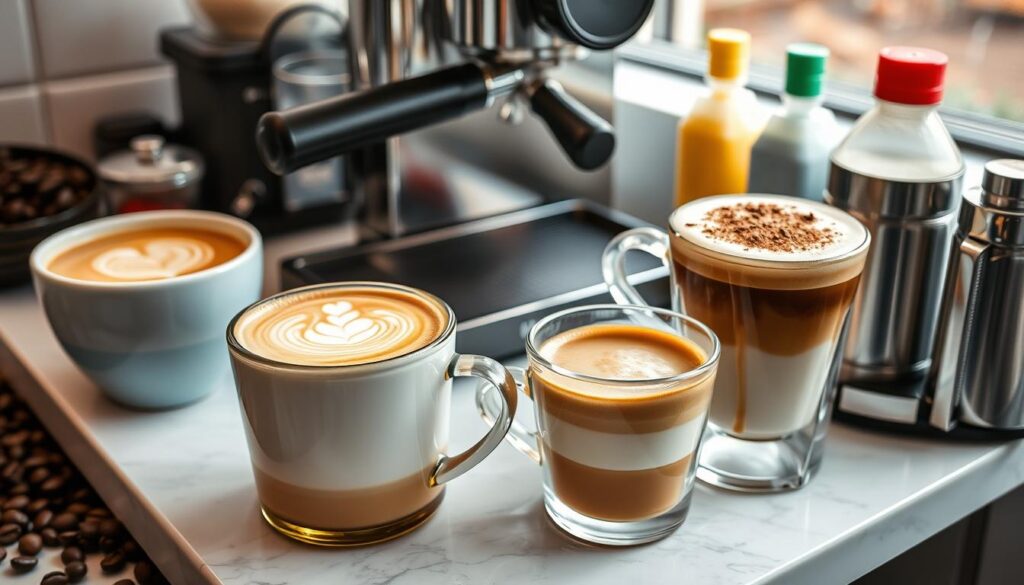Coffee lovers are now making espresso-based drinks at home. DIY Starbucks drinks are within reach for those who love coffee. You can make your favorite coffee recipes with precision and your own flavor.
Making cafe-quality espresso drinks at home has many benefits. You’ll save money, choose the best ingredients, and make each drink just right. This guide will turn your kitchen into a coffee paradise, from creamy lattes to strong Americanos.
Whether you’re a coffee lover or just enjoy a good cup, learning to make espresso-based drinks is exciting. You’ll discover new techniques, equipment, and recipes. This will take your home coffee game to the next level.
Key Takeaways
- Save money by creating cafe-style drinks at home
- Control ingredient quality and customize flavors
- Learn professional brewing techniques
- Experiment with various espresso-based beverages
- Develop barista-level skills in your own kitchen
Essential Equipment for Making Starbucks-Style Drinks at Home
Making top-notch espresso drinks starts with the right gear. Whether you love coffee a little or a lot, good tools can change your day.
Choosing the Right Espresso Machine
Choosing an espresso machine is key for cafe-quality drinks. There are many types for different skills and budgets:
- Semi-automatic machines for hands-on brewing
- Automatic machines for consistent shots
- Super-automatic machines for one-touch convenience
Must-Have Barista Tools
Professional baristas use special tools for perfect drinks. You’ll need:
- Precision tamper for even coffee compression
- Milk steaming pitcher
- Thermometer for ideal milk temperature
- Cleaning brushes
Coffee Bean Grinder Options
A good coffee grinder is key for rich espresso flavors. Here are your options:
| Grinder Type | Pros | Best For |
|---|---|---|
| Blade Grinders | Affordable, compact | Beginners |
| Burr Grinders | Consistent grind, precise control | Serious home baristas |
| Conical Burr Grinders | Minimal heat, optimal flavor preservation | Espresso enthusiasts |
“The right equipment turns coffee brewing from a task into an art form.” – Professional Barista
Pro tip: Invest in quality home coffee equipment that matches your skill level and passion for espresso drinks.
Selecting and Storing Premium Coffee Beans
Making the perfect espresso begins with top-notch premium coffee beans. The right beans can elevate your coffee game from good to great. Knowing about coffee roasts and how to store them is key to keeping your coffee fresh.
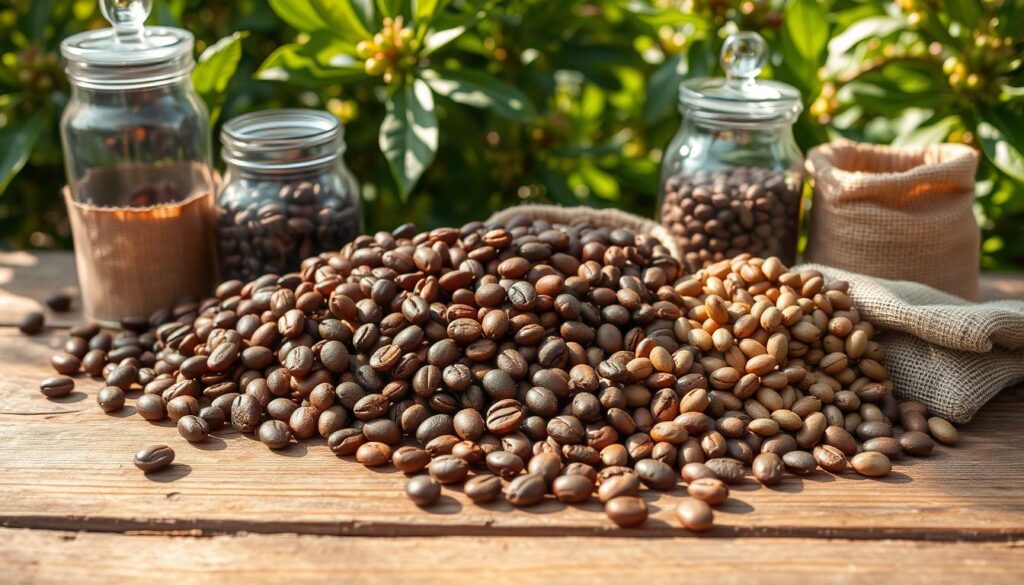
“Great espresso begins with exceptional beans and proper care.” – Coffee Experts
Coffee roasts greatly affect the flavor. Each roast level brings a unique taste:
| Roast Type | Flavor Characteristics | Espresso Suitability |
|---|---|---|
| Light Roast | Bright, acidic, complex | Delicate espresso flavor |
| Medium Roast | Balanced, smooth | Versatile espresso base |
| Dark Roast | Bold, intense, slightly bitter | Traditional espresso profile |
Keeping coffee fresh is all about the right storage. Store beans in a sealed container, away from light, heat, and moisture. Whole beans are better than pre-ground, so get a good grinder for the best taste.
- Use opaque, sealed containers
- Store at room temperature
- Avoid refrigerator storage
- Purchase small batches for maximum freshness
Pro tip: Buy beans from local roasters who provide recent roast dates to ensure peak flavor and quality.
Mastering the Perfect Espresso Shot
Making a great espresso shot needs precision and knowing the brewing basics. It’s a mix of science and skill. This creates a drink that coffee lovers adore.
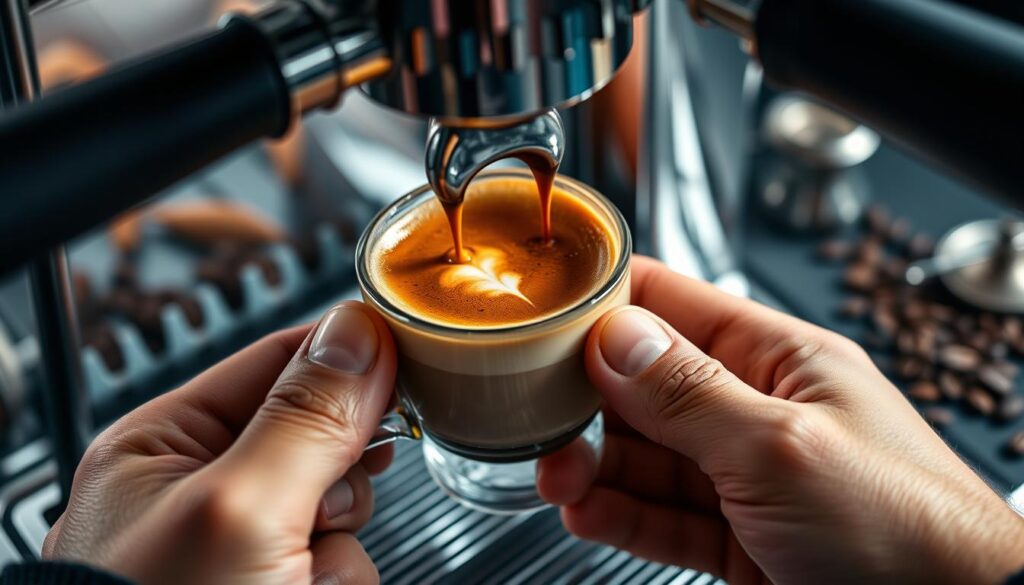
Temperature and Pressure Control
Temperature is key for a perfect espresso. The best brewing temperature is between 195°F and 205°F. This brings out the coffee’s flavors and smells.
Pressure is also important. Professional machines use 9 bars of pressure. This ensures the coffee is extracted just right.
- Optimal espresso temperature: 195°F – 205°F
- Recommended espresso pressure: 9 bars
- Key factors affecting extraction: water temperature, pressure, grind size
Timing Your Espresso Pull
Timing is crucial for the espresso’s taste. A good shot takes 25-30 seconds. It should be about 1-1.5 ounces of strong coffee.
| Extraction Time | Shot Volume | Flavor Characteristics |
|---|---|---|
| 20-22 seconds | 0.75-1 oz | Under-extracted, sour taste |
| 25-30 seconds | 1-1.5 oz | Balanced, optimal flavor |
| 35-40 seconds | 1.5-2 oz | Over-extracted, bitter taste |
Troubleshooting Common Espresso Issues
Even pros face problems with espresso. Knowing common issues helps fix them quickly.
“Perfecting espresso is a journey of continuous learning and subtle adjustments.” – Professional Barista
- Uneven extraction: Check grind consistency
- Weak shot: Adjust grind size finer
- Bitter taste: Reduce extraction time
Mastering temperature, pressure, and timing boosts your brewing skills. You’ll make shots as good as those in cafes.
DIY Starbucks Espresso-Based Drinks: From Lattes to Americanos
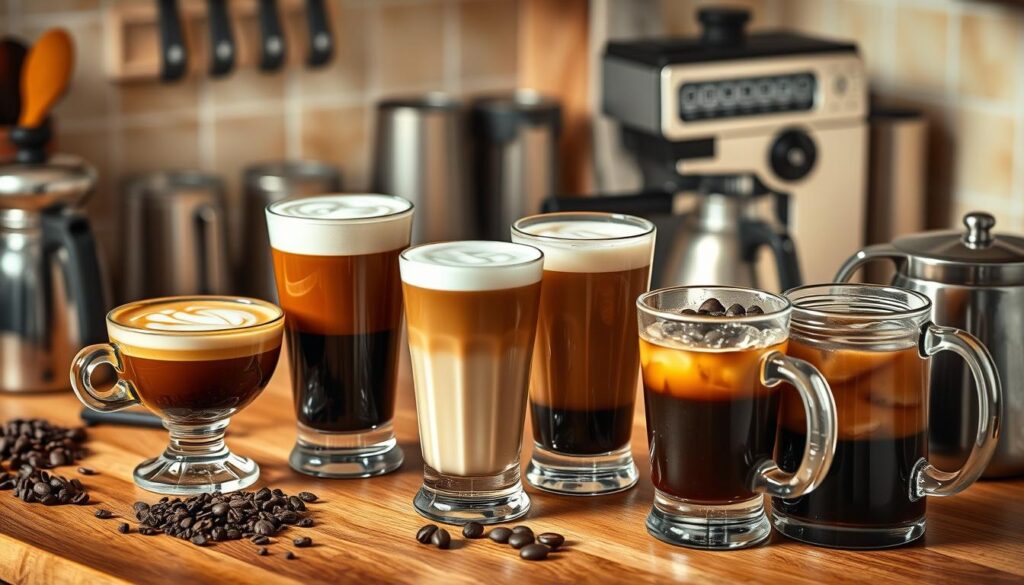
Want that perfect coffee shop vibe at home? Making homemade lattes and DIY Americanos is simpler than you think. With a few basic steps, you can turn your kitchen into a personal espresso bar, just like Starbucks.
Espresso-based drinks open up a world of tasty options. Whether you love coffee or are a serious fan, learning these Starbucks copycat recipes will boost your home brewing skills. The right setup is key to making professional-quality drinks.
- Lattes: Mix rich espresso with steamed milk for a creamy treat
- Americanos: A simple yet elegant hot or iced espresso drink
- Cappuccinos: A perfect mix of espresso, steamed milk, and foam
“The art of making great espresso is part science, part passion.” – Professional Barista
Each espresso drink needs special techniques. It’s all about knowing your gear, coffee beans, and brewing methods. From pulling the perfect shot to making silky foam, these skills turn regular coffee into something special.
Ready to be your own barista? The next sections will take you through the world of homemade espresso drinks. You’ll learn to make your favorite cafe classics right in your kitchen.
Milk Steaming and Frothing Techniques
Learning to froth milk is an art that turns simple espresso into top-notch drinks. The right method can make your homemade coffee drinks as good as those from a barista.
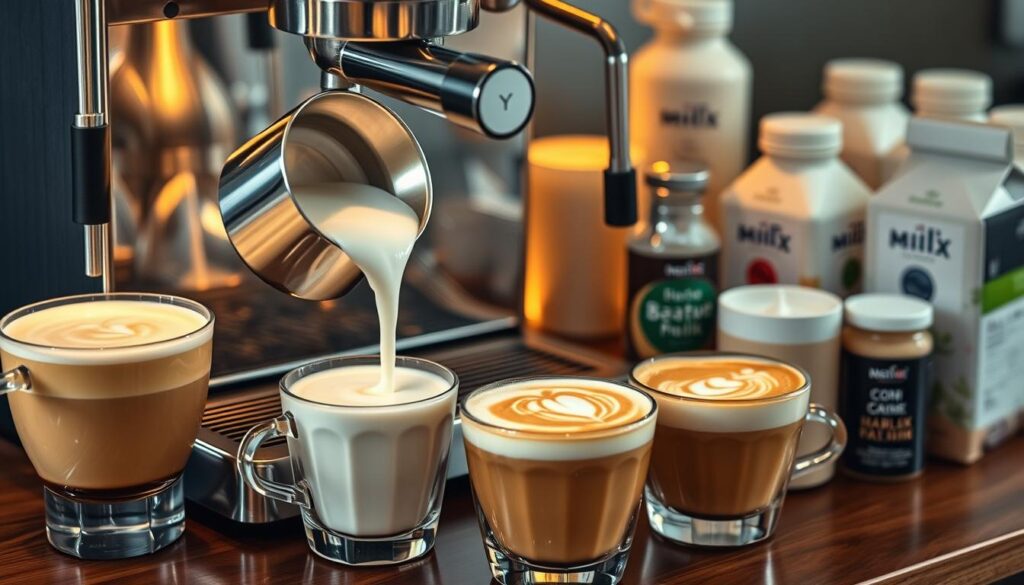
Creating Microfoam for Lattes
Microfoam is a key skill for baristas. It’s a smooth milk texture made by steaming milk just right. This breaks down milk proteins into tiny bubbles.
- Start with cold milk straight from the refrigerator
- Use a milk pitcher with a pointed spout for better control
- Position the steam wand at a 45-degree angle
- Listen for a gentle hissing sound during steaming
Exploring Milk Alternatives
Today, there are many milk alternatives to try. Each one has its own special qualities for your espresso drinks.
| Milk Type | Frothing Difficulty | Flavor Profile |
|---|---|---|
| Whole Milk | Easy | Creamy, rich texture |
| Oat Milk | Moderate | Smooth, slightly sweet |
| Almond Milk | Challenging | Light, nutty flavor |
Temperature Guidelines for Perfect Drinks
Temperature is very important when steaming milk. Ideal steamed milk temperature ranges between 140-160°F. If it gets too hot, it can ruin the milk’s taste and texture.
“The difference between good and great coffee is often in the milk steaming technique.” – Professional Barista
Getting good at frothing milk takes practice and patience. Try different methods and milk types to get the perfect microfoam.
Crafting Popular Starbucks Latte Variations
Making Starbucks-style lattes at home is a fun journey for coffee lovers. It lets you try new flavors in your kitchen, saving money and boosting your creativity.
- Vanilla Latte: A smooth, sweet classic
- Caramel Macchiato: Rich and indulgent
- Mocha Latte: Chocolate lover’s dream
- Cinnamon Dolce Latte: Warm and spicy
To make your homemade latte better, learn latte art. Start with simple designs like hearts or rosettas. Practice pouring to make your drink look amazing.
“Great coffee is an art form that begins with passion and precision” – Barista Wisdom
Here’s a quick guide to essential ingredients for your Starbucks-style lattes:
| Latte Type | Key Ingredients | Flavor Profile |
|---|---|---|
| Vanilla Latte | Espresso, Steamed Milk, Vanilla Syrup | Sweet, Smooth |
| Caramel Macchiato | Espresso, Milk, Vanilla Syrup, Caramel Drizzle | Rich, Buttery |
| Mocha Latte | Espresso, Milk, Chocolate Syrup | Chocolatey, Intense |
Pro tip: Try different milks and syrup amounts to make your latte just right!
Making Classic Cappuccinos and Americanos
Making the perfect homemade cappuccino or DIY Americano needs precision. You must know about espresso ratios and coffee temperature. By mastering these, you can improve your coffee game.
Perfect Water-to-Espresso Ratios
Getting the right espresso ratios is key for authentic coffee. Here’s what you need for a classic DIY Americano:
- Standard Americano: 1 shot of espresso to 2-3 parts hot water
- Stronger Americano: 1 shot of espresso to 1-2 parts hot water
- Lighter Americano: 1 shot of espresso to 4 parts hot water
Temperature Control Tips
Keeping the coffee temperature right makes a big difference. Precision is key for making great homemade cappuccinos and Americanos.
| Drink Type | Ideal Temperature | Brewing Technique |
|---|---|---|
| Americano | 160-170°F | Hot water added after espresso extraction |
| Cappuccino | 150-160°F | Steamed milk incorporated carefully |
“The difference between a good and great coffee is often in the details of temperature and ratio.” – Professional Barista
Try these tips to make your home coffee better. Soon, you’ll be making cafe-quality drinks with ease.
Adding Flavored Syrups and Toppings
Coffee customization turns a simple espresso drink into a unique masterpiece. Homemade coffee toppings and syrups open up endless possibilities for creating special flavors in your kitchen.
Making delicious flavored coffee at home begins with syrup creation. You can make your own syrups with just a few ingredients:
- Vanilla bean syrup
- Caramel swirl
- Hazelnut cream
- Cinnamon vanilla blend
If you prefer quicker options, store-bought syrups are a great choice. Pro tip: Start with small amounts and gradually adjust to find your perfect taste balance.
“The secret to great coffee is personal expression through flavors” – Artisan Barista Wisdom
Toppings can make your drink go from basic to amazing. Try these homemade coffee toppings:
- Fresh whipped cream
- Chocolate shavings
- Caramel drizzle
- Cinnamon sprinkle
Try different coffee customization techniques to create your own special drink. Each addition adds a new layer to your espresso experience.
Seasonal Starbucks Drink Recipes
Coffee lovers rejoice! Making seasonal coffee drinks at home is easy. Each season brings new flavors that make coffee special. From warm autumn drinks to cool summer ones, you can make cafe-quality drinks at home.
Fall Favorites: Pumpkin Spice Perfection
The Pumpkin Spice Latte is a fall favorite. To make it at home, you need:
- Espresso shots
- Pumpkin puree
- Warm spices (cinnamon, nutmeg)
- Steamed milk
- Whipped cream
Holiday Special Drinks: Festive Flavors
Holiday coffee recipes warm up winter. Peppermint mochas and gingerbread lattes make coffee a special treat.
“The best memories are made when delicious drinks bring people together” – Coffee Enthusiast
Summer Refreshers: Iced Coffee Delights
As summer heats up, iced coffee drinks are a must. You can make classic cold coffee drinks easily with just a few things:
- Cold brew concentrate
- Flavored syrups
- Milk alternatives
- Ice
Try these seasonal recipes to make your home coffee better. Impress your friends and family with your barista skills.
Conclusion
Learning to make coffee at home is more than just saving money. It turns your kitchen into a cozy coffee spot. You get to explore flavors, precision, and creativity as you learn.
Spending time on coffee skills lets you make drinks just how you like them. You can tweak the espresso strength, milk temperature, and syrup mix. This way, you control every sip.
Home espresso is more than making cafe-style drinks. It’s about making your coffee time special. As you grind beans, pull shots, and steam milk, you’ll love coffee more. Your kitchen becomes a real cafe, showing off your skills in every cup.
Begin slowly and be kind to yourself. Remember, every top barista started where you are. Enjoy learning, share your coffee with friends, and savor the tasty results of your new skills.
FAQ
What equipment do I need to make Starbucks-style espresso drinks at home?
You’ll need a good espresso machine, a coffee grinder, and a milk frother. Also, barista tools like a tamper and milk pitcher are important. The right tools help make authentic cafe drinks at home.
How do I choose the right coffee beans for homemade espresso drinks?
Choose freshly roasted, high-quality beans with a roast date in the last two weeks. Go for espresso blends or medium to dark roasts. These provide the rich flavor of Starbucks-style drinks.
What’s the secret to pulling the perfect espresso shot?
Focus on three things: water temperature (195-205°F), pressure (9 bars), and extraction time (25-30 seconds). These ensure a balanced, flavorful shot.
Can I make dairy-free versions of Starbucks-style drinks?
Yes! Use almond, oat, soy, or coconut milk for dairy-free options. Each milk type adds a unique flavor and frothing quality to your drinks.
How can I create flavored syrups at home?
Making flavored syrups is simple. Mix equal parts water and sugar, then add flavorings like vanilla or cinnamon. Simmer until the sugar dissolves and store in the fridge.
What’s the difference between a latte and a cappuccino?
A latte has more steamed milk with a small foam layer. A cappuccino has equal parts espresso, steamed milk, and foam.
How can I make seasonal Starbucks drinks at home?
Make seasonal drinks by using specialty syrups and spices. For example, a Pumpkin Spice Latte uses espresso, milk, pumpkin puree, and fall spices like cinnamon.
What’s the best way to store coffee beans?
Store whole beans in an airtight container away from light, heat, and moisture. Keep them at room temperature and use within 2-3 weeks for the best flavor.
Do I need professional barista skills to make good espresso drinks?
No, you don’t need to be a pro! With practice and the right equipment, anyone can make great drinks at home. Start simple and get better with time.
How can I improve my milk frothing technique?
Practice frothing by keeping the steam wand just below the milk’s surface. Create a whirlpool effect. Use cold, fresh milk for a smooth, paint-like texture without big bubbles.

